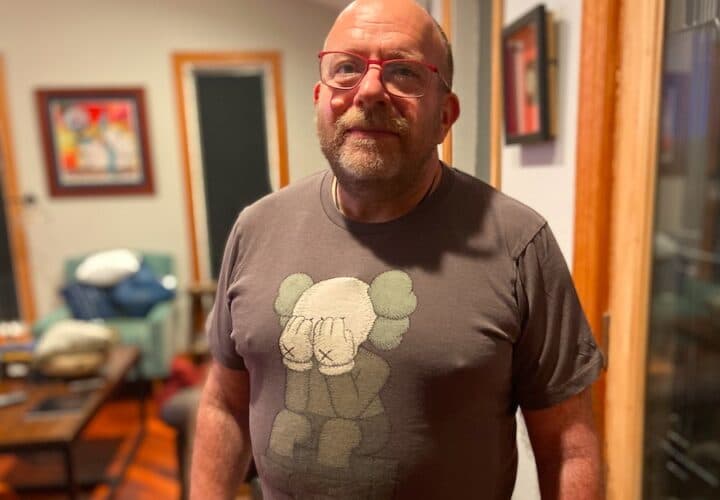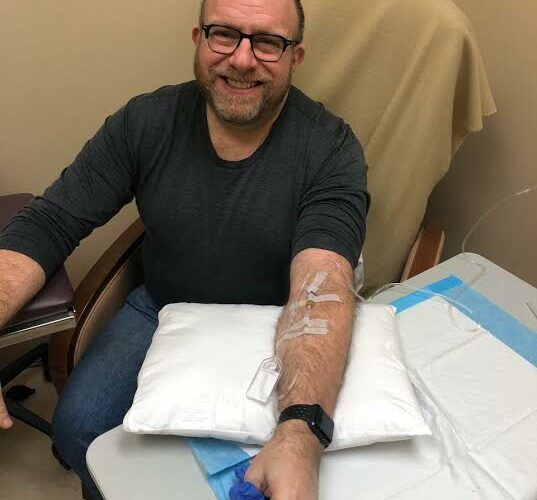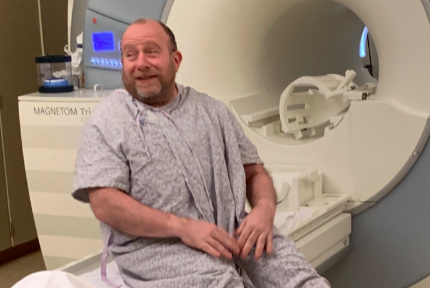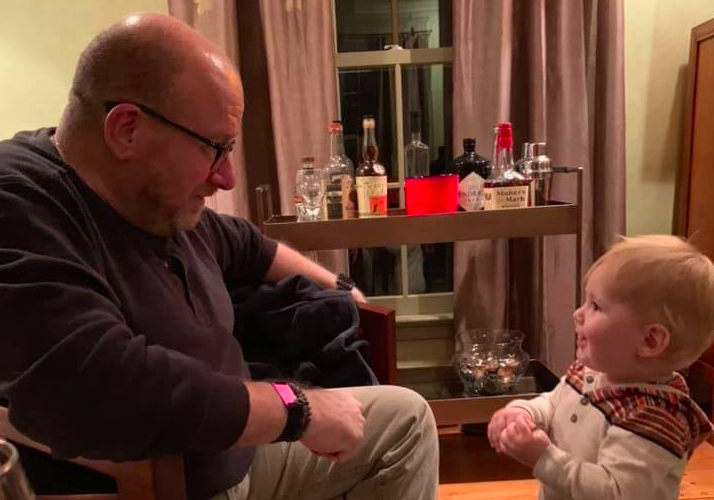Well, I won’t try that again.
Last week, I found myself bent over a table, resting my head on pillows as a doctor injected lidocaine, an anesthetic, into my lower back, and then tried to guide a needle into my spine. It was part of a voluntary test for the new trial for aducanumab, the Biogen drug that may have shown promise in treating Alzheimer’s in people experiencing the earliest stages of the disease.
Ever since I received my diagnosis of early-onset Alzheimer’s through an earlier aducanumab trial, I’ve wanted to do everything I could to further the research and science behind the disease. I even took to wearing what I called “silly shoes” to try to highlight the importance of participating in research trials.
I’ve participated in numerous MRIs, taken as many PET scans as requested and shared what feels like gallons of blood samples. So agreeing to a lumbar puncture (also known as a spinal tap) to withdraw cerebrospinal fluid for testing as part of the new trial was sort of a no-brainer. Even though I wasn’t happy with the idea of a needle in my spine, I dismissed my discomfort and signed the waivers.
No one told me that I shouldn’t eat breakfast before the procedure so I had my normal breakfast — buttered bagel, two vegetarian “sausage” patties and, since I knew I wasn’t going to have lunch until late in the day, I had a slice of banana bread that a friend made. Oh, yes, and a large Starbucks coffee. I told the staff that I ate breakfast, and no one seemed concerned.
The time arrived. I left my husband Tim in the waiting area (masked and sitting far from anyone else) and walked back to the procedure area. My blood pressure was slightly elevated but not too terrible. They took some extra blood and then we got started.
A few tiny pricks from the lidocaine injections then the doctor started to thread the needle in. It was a weird feeling, no pain but definitely uncomfortable. Suddenly though, I started to break out in a sweat, and then the nausea began to build. Within seconds, I was warning the doctor and technician that I was going to throw up.
Throwing up is never a pleasant process — and banana bread definitely tastes better going in — but I eventually stopped emptying my stomach. Soon after, the doctor said he wasn’t having any luck and suggested we try instead to have me lay down in a fetal position.
After a few minutes of repositioning, re-cleaning my back and re-numbing the area with additional lidocaine, the process started again. More uncomfortable pressure, a few twinges of light pain and then, oh God, the nausea started again.
I didn’t think there was anything left but my stomach surprised me. And by the time I finished, the doctor and technician decided that enough was enough. I was either having a negative reaction to the lidocaine or I was experiencing a vasovagal episode.
I never felt like I was going to pass out, which is typical for vasovagal episodes, but my blood pressure dropped, and we already discussed the nausea. Eventually I started to shake and got really cold.
After being covered with two blankets and a few minutes of rest, everything returned to normal. My back was slightly sore, and the discomfort built through the day. But two Aleve pills took care of that, and I slept as well as could be expected.
As I write this 24 hours after the procedure, I feel fine: a little abashed that I couldn’t handle the test and not very interested in trying again.
Nothing, however, will stop me from continuing to participate in the research that could help find a treatment or eventual cure for this disease. I will continue to happily offer my arms up for blood draws and infusions.
I’ll spend as many hours as necessary in MRI tubes. Injecting radioactive material into my arm for a PET scan? Easy peasy. And if they really needed me to try a lumbar puncture again, I’ll try. Maybe under general anesthesia , but I’ll try.
Want to learn more about clinical trials
for Alzheimer’s and dementia?
Check out the Lilly Trial Guide.
I’ve had second thoughts about posting this essay because I don’t in any way want to discourage people from participating in research for Alzheimer’s. Scientists are making slow but steady progress in getting to the bottom of this disease, but one of the biggest hurdles is finding people willing to participate in trials.
So, yes, participating in research isn’t always easy. There can be uncomfortable moments and needles are never great fun. But the end goal — eliminating Alzheimer’s — is so very much worth it.
Later this week, I’m scheduled to receive my first dose of aducanumab since the original trials stopped in March 2019. Unlike the lumbar puncture, I’m looking forward to my first infusion and will update again soon.
Phil Gutis is a former New York Times reporter and current Being Patient senior reporter who was diagnosed with early onset Alzheimer’s. This article is part of the PHIL’S JOURNAL series, in which Phil chronicles his experience living with Alzheimer’s.






Phil, I am a participant in the MAPS Study and my first lumbar puncture was scheduled in May but was cancelled because of COVID-19. I probably shouldn’t have read your post 😙 but please wish me luck later this summer when I have mine. I was instructed not to eat beforehand and told that only one doctor performed all of their lumber punctures. That sounds encouraging to me. I am passionate about taking part in clinical trials, also, and I have had numerous radioactive PET scans and MRIs, blood tests, have spit in a tube , swabbed the inside of my check, and have an online study that reaches out to me every 6 months to take online cognitive tests and answer many questions about my memory. My husband also is involved and contacted online to give his opinion of my memory. Good luck on your journey. I would love to be part of the Biogen trial!! I am a current member of the Nat’l Alzheimer’s Ass. Early Stage Advisers Group (ESAG). Karen Weede